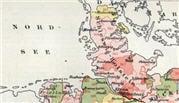Source Information
About Mannheim, Germany, Death Records, 1870-1950
About this collection
This collection contains death records from Mannheim covering the years 1870 up to and including 1950. Mannheim is situated on the right (east) bank of the Rhine at the mouth of the Neckar River in the state of Baden-Württemberg. It is home to a commercial and industrial center and an important inland port. Mannheim is known for its baroque palace with one of the largest castles in the world. Because of the city's pattern of roads are laid out on a grid, Mannheim bears the nickname "Quadratestadt" (City of the Squares). During the time period of this collection, Mannheim belonged to the Grand Duchy of Baden and later the Republic of Baden. The collection also includes records from eight additional communities. Records for Rheinau begin in 1902.
Beginning on February 1, 1870, birth, marriage and death records in the former Grand Duchy of Baden were created by local registry offices. The collected records are arranged chronologically and usually bound together in the form of yearbooks. These are collectively referred to as "civil registers." Occasionally, alphabetical directories of names were also created. While churches continued to keep traditional records, the State also mandated that the personal or marital status of the entire population be recorded.
What you can find in the records
Death records were created using preprinted forms that were filled in by hand by the registrar. In each record the date of death usually differs from the date it was registered. Depending on the individual form or on the formulations used by the registrar, you may find:
- Sequential or Certificate Number
- Registration Date
- Informant: Occupation, Given Names, Last Name, Residence/Address
- Deceased: Occupation, Given Names, Last Name, Maiden Name, Age, Denomination, Residence/Address, Birthplace, Marital Status, Spouse/Parents, Place/Date of Death, Time of Death
- Signatures
More about using this collection
Records before 1876 have two death records per page. After the introduction of a number of uniform formats, each record comprises an entire page. Additional events from the life of the deceased were sometimes recorded later on in the margins. These notes, sometimes referred to as "narration," can contain very useful information but they have not been indexed. As a result, information from the notes will not found via the search form. The “Informant” was usually a relative of the deceased. Images for individual year-ranges may be displayed by selecting the place of registration in the box "Browse this collection” then by selecting the year-range desired.
About this collection
This collection contains death records from Mannheim covering the years 1870 up to and including 1950. Mannheim is situated on the right (east) bank of the Rhine at the mouth of the Neckar River in the state of Baden-Württemberg. It is home to a commercial and industrial center and an important inland port. Mannheim is known for its baroque palace with one of the largest castles in the world. Because of the city's pattern of roads are laid out on a grid, Mannheim bears the nickname "Quadratestadt" (City of the Squares). During the time period of this collection, Mannheim belonged to the Grand Duchy of Baden and later the Republic of Baden. The collection also includes records from eight additional communities. Records for Rheinau begin in 1902.
Beginning on February 1, 1870, birth, marriage and death records in the former Grand Duchy of Baden were created by local registry offices. The collected records are arranged chronologically and usually bound together in the form of yearbooks. These are collectively referred to as "civil registers." Occasionally, alphabetical directories of names were also created. While churches continued to keep traditional records, the State also mandated that the personal or marital status of the entire population be recorded.
What you can find in the records
Death records were created using preprinted forms that were filled in by hand by the registrar. In each record the date of death usually differs from the date it was registered. Depending on the individual form or on the formulations used by the registrar, you may find:
- Sequential or Certificate Number
- Registration Date
- Informant: Occupation, Given Names, Last Name, Residence/Address
- Deceased: Occupation, Given Names, Last Name, Maiden Name, Age, Denomination, Residence/Address, Birthplace, Marital Status, Spouse/Parents, Place/Date of Death, Time of Death
- Signatures
More about using this collection
Records before 1876 have two death records per page. After the introduction of a number of uniform formats, each record comprises an entire page. Additional events from the life of the deceased were sometimes recorded later on in the margins. These notes, sometimes referred to as "narration," can contain very useful information but they have not been indexed. As a result, information from the notes will not found via the search form. The “Informant” was usually a relative of the deceased. Images for individual year-ranges may be displayed by selecting the place of registration in the box "Browse this collection” then by selecting the year-range desired.
 Need help with the German language?
Need help with the German language?